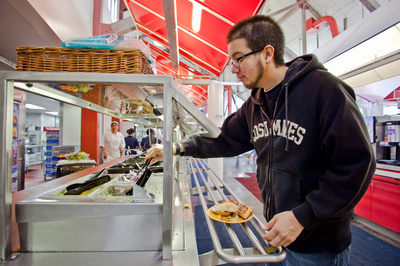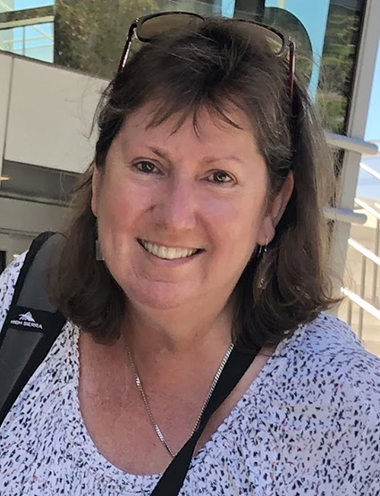Sue Matthews, Associate Vice Chancellor Colleges, Housing and Educational Services, is being recognized as the sustainability champion of the month for furthering the sustainability mission at UCSC in too many ways to mention.
Thanks to Sue’s strong vision and tenacity, very impactful sustainability practices and changes were implemented at UC Santa Cruz. Her scope of work is vast, reaches so many areas of campus and has brought great sustainable achievements to UCSC. Learn more about Sue and her amazing work, in our interview with her.
Can you tell us a bit about yourself including your background, and what brought you to UCSC?
I’ve had the pleasure of working on our beautiful UCSC campus for many years, originally arriving in 1999 as the College Administrative Officer for Crown College. Having been born and raised in the Bay Area and then heading south for my education and the first decade of my career, returning to Northern CA was a return home and gave me the chance to be near family again, and to begin my family as well. Over the past two decades my scope of work on campus has broadened and I now serve as the Associate Vice Chancellor for the Colleges, Housing and Educational Services (CHES) organization.
It feels like sustainability has always been a part of my life. Growing up in the ‘60s my mom washed out food cans, cut off the bottom and let us stomp them flat. Together with glass bottles and stacks of newspapers, bags and bags of reusable products would line the side of the house until there was sufficient quantity to put them in the station wagon and haul them away. Nobody else did this at their homes. We were a bit different back then, a bit odd I thought at the time, but my mom, who has since passed away, will remain as the champion who planted my sustainability roots way back when.
What is your role in your current position and how did you begin to incorporate sustainability practices at work?
In my current role I oversee several large campus operations – College Student Life, Housing Service operations for all undergraduate, graduate and employee housing communities, Dining Services, Facilities, the Bay Tree Bookstore and Child Care, to name just a few. As the leader of this organization, I’ve had the opportunity to emphasize sustainability efforts through established goals, to encourage creative efforts and to help remove barriers that might be obstacles for implementation. Bottom line? I strive to enable us to get to “yes”.
Overall the campus has benefitted from a very dynamic and dedicated team of staff members in CHES who have enabled change that has made a significant contribution to campus-wide sustainability goals and initiatives. Clint Jeffries, Assistant Director of UC Santa Cruz Dining, who was recently honored as a Sustainability Champion, gave a great rundown of many of the incredible efforts Dining Services has undertaken in support of UCSC’s Zero Waste goals. Housing, too, has made great strides in supporting this important effort. Reflected in our commitment to living/learning communities, and always eager to respond to student enthusiasm around this issue, we took a keen interest in identifying and promoting unique ways in which we could both educate students and families about the need for greater participation in zero waste activities. It’s been at least 10 years now that Fall Move-In Weekend has incorporated the use of Cardboard Corrals – temporary, centralized locations at each college, overseen by staff and/or student workers, where students and their families are directed to take all left-over moving materials for proper disposal.
 Single-use products also came under real scrutiny around that same time. Following a student initiated pilot program at Stevenson College, the “Paper Towel Free” initiative was expanded across every residential community. Previously representing ⅓ of the volume of UCSC waste being transported to the land-fill, this one shift enabled a substantive contribution towards zero waste goals. All it needed was a “yes, make it so” affirmation to be employed campus-wide.
Single-use products also came under real scrutiny around that same time. Following a student initiated pilot program at Stevenson College, the “Paper Towel Free” initiative was expanded across every residential community. Previously representing ⅓ of the volume of UCSC waste being transported to the land-fill, this one shift enabled a substantive contribution towards zero waste goals. All it needed was a “yes, make it so” affirmation to be employed campus-wide.
Removing trays from the dining halls substantially reduced excess food waste and eliminated significant water usage.
What does sustainability mean to you?
To me sustainability is a way of thinking, a framework for making choices to ensure the greater availability of all manner of resources in our future. Current convenience is often possible only by deferring or redistributing costs or consequences. In a world where the availability of resources is uneven and access to those resources hard to come by, sustainability is a responsible and respectful way to regularly and reliably contribute to the greater good.
You were responsible for the initiative to remove plastic water bottle sales from Dining-run facilities, allowing for a “partial-ban” campuswide. How did that come about?
Yes, I worked closely on this effort with Take Back the Tap (TBTT), a student-led organization with tremendous enthusiasm for the cause of eliminating single-use water bottles from the campus combined with an intelligent, research-based approach to the issue. While this collaboration did ultimately result in Dining-run facilities no longer stocking single-use water bottles for sale, the effort was actually much broader. CHES partnered in the funding to enable the installation of bottle filling stations across campus and in housing communities. We ceased selling bottled water during Commencement activities and implemented free water bottle filling stations. Single-use water bottles are no longer offered for use at any student programs, events or trainings hosted by CHES residential communities.
Your vision to develop the Student Sustainability Advisors (SSA) Program, funded by you, has materialized in 2018 with formal partnership with the Sustainability Office, by dedicating a professional staff, Kristen Lee, to support sustainability initiatives across CHES. Can you tell us the motivation and some of the goals of this partnership, share some history, and successes of this program so far?
By 2012, CHES had already implemented a student worker program focused on supporting operations by collecting, transporting, and sorting recyclables and otherwise assisting staff in better managing waste streams. Early that summer, I reached out to the Sustainability Office for collaboration in developing a set of student worker positions, Student Sustainability Advisors (SSA’s), living on campus in our residential communities, working closely with residential life staff to produce educational programs and events aimed at increasing awareness and participation in efforts supportive of UCSC’s zero waste goals. This program was introduced in the fall of 2012 and has been going strong ever since. SSAs have always been relied on to provide educational and programmatic support to their on-campus communities.
As the SSA program grew increasingly robust, we realized it would benefit most by having leadership provided by true experts in the field of sustainability. With this, in 2018, CHES and the Sustainability Office developed a partnership wherein CHES provides partial funding for a Sustainability Office staff person (currently, the amazing Kristen Lee), who oversees the hiring, training, and supervision of the SSA program, partners with the People of Color Sustainability Collective, ODEI and CHES diversity education efforts to promote inclusive sustainability. The SSA’s coordinate zero waste move-in and move-out efforts, incorporate sustainability training into orientation for new UCSC students, promote sustainable practices within summer conference guest communities, and otherwise advise all CHES operations in a constant improvement effort as regards our contribution to campus zero waste goals and sustainability plans.
What other initiatives did I not mention above that are just business as usual now but that you helped start?
In the late-2000’s I had the opportunity to work with the then incredibly ambitious UCSC student, Tim Galarneau, to introduce and advance the Sustainable FoodServices portion into the UC Systemwide policy on Sustainable Practices. Until then, food services had been excluded from the policy. Through systemwide vetting with Housing and Dining Directors and ultimately with UC approval in 2009, the Food Services policy goals were incorporated into the Systemwide policy on Sustainable Practices.
Every year we look to advance something new that often become day-to-day practices. Significant water use reduction efforts implemented (low-flow toilets, water-saving shower nozzles, reduced irrigation to lawns, playing fields, support for Drop Your Own Drip, distribution of timers to encourage spending less time in the shower, water reduction pledges, etc.).
More recently, we took on the task of eliminating plastic bag usage in the Bookstore.
What is your strategy to entice those who “have not joined” your sustainability efforts yet?
Sustainability efforts cannot be championed alone in a silo. It takes an entire team effort. The recently developed Sustainability Certificate program is a great opportunity for managers to learn and think about ways to incorporate sustainable practices directly into their work, which is why I required completion of the Certificate program by all CHES managers.
Being a change agent isn’t always easy and related efforts are not always immediately embraced. My advice on this is to do your research, get expert input from the Sustainability Office, embrace student passion and interest to see if there is a feasible solution with whatever the initiative may entail and, ultimately, once you have a plan -- take the plunge!
Anything else you would like to share or add?
As the scope of my responsibilities change over time, I strive to embrace the honor of being in a position to enact change and advance forward momentum on critical campus goals.
Lastly, what does Sue Matthews enjoy doing outside of work?
Outside of work I have the pleasure of raising my two young boys, ages 5 and 10. While they don’t actually stomp on cans like I used to in my youth, they know the importance or sorting the bin correctly. And to them, it isn’t odd. It is just what we all do.

